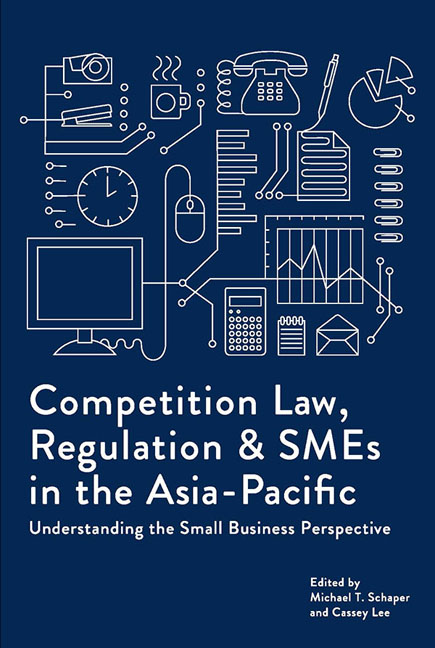 Competition Law, Regulation and SMEs in the Asia-Pacific
Competition Law, Regulation and SMEs in the Asia-Pacific Book contents
- Frontmatter
- Contents
- Foreword
- About the Contributors
- 1 Introduction: Making the Invisible SME More Visible in Competition Policy and Law
- Section 1 Theories And Basic Concepts
- Section 2 Smes And Competition Law
- Section 3 Country Studies
- 12 Competition Law, Regulation, and Trade: Implications for Productivity and Innovation in Singaporean Manufacturing SMEs
- 13 SME Law and Abuse of a Superior Bargaining Position in Japan
- 14 Competition Law, Policy, and Smes in South Korea
- 15 Competition Law Implementation and Smes: Singapore's Experience
- 16 Competition Law and SMEs in Indonesia
- 17 Smes and Malaysia's New Competition Law: Experiences to Date
- 18 Competition Policy and Sme Development in Vietnam
- 19 China's Anti-Monopoly Law and the Sme Sector
- 20 A New Competition Agency Learns to Deal with Smes: The Case of the Hong Kong Competition Commission
- 21 The Regulation of Television Programme Production Contracts under Japan's Subcontract Act
- 22 Small Enterprises and Competition Policy in Pacific Island Countries
- Index
13 - SME Law and Abuse of a Superior Bargaining Position in Japan
from Section 3 - Country Studies
Published online by Cambridge University Press: 05 August 2017
- Frontmatter
- Contents
- Foreword
- About the Contributors
- 1 Introduction: Making the Invisible SME More Visible in Competition Policy and Law
- Section 1 Theories And Basic Concepts
- Section 2 Smes And Competition Law
- Section 3 Country Studies
- 12 Competition Law, Regulation, and Trade: Implications for Productivity and Innovation in Singaporean Manufacturing SMEs
- 13 SME Law and Abuse of a Superior Bargaining Position in Japan
- 14 Competition Law, Policy, and Smes in South Korea
- 15 Competition Law Implementation and Smes: Singapore's Experience
- 16 Competition Law and SMEs in Indonesia
- 17 Smes and Malaysia's New Competition Law: Experiences to Date
- 18 Competition Policy and Sme Development in Vietnam
- 19 China's Anti-Monopoly Law and the Sme Sector
- 20 A New Competition Agency Learns to Deal with Smes: The Case of the Hong Kong Competition Commission
- 21 The Regulation of Television Programme Production Contracts under Japan's Subcontract Act
- 22 Small Enterprises and Competition Policy in Pacific Island Countries
- Index
Summary
Japan's policy towards small and medium-sized enterprises (SMEs) has gone through several major changes in its philosophy and practices over the last century. In the period immediately after World War I, Japanese government strategies were principally aimed at developing a well-ordered market and encouraged the grouping of enterprises. In the aftermath of World War II, this policy changed to be essentially focused on pro-competitive policy settings during the post-war Occupation Period. However, under the 1963 SME Basic Act, national SME policy changed once more, this time to focus on deterring the abuse of superior bargaining position. Japanese SMEs have often suffered from such abuses and, as a result, several pieces of law (including the Antimonopoly Act and the Subcontract Act) have been enacted to deal with the issue. This chapter gives a review of these regulations, and discusses some cases arising from its application.
Japanese SME Policy
Japan, an island country with a population of approximately 126 million, has a political system similar to that of many Western nations, but has evolved its own unique set of competition laws and small and medium-sized enterprise (SME) policy responses.
Some institutional structures are very similar to those in most other developed nations. For example, the nation is a constitutional monarchy with a parliamentary system of government. Japan's elected legislature, the Diet, consists of two elected chambers: the House of Representatives and the House of Councillors. The head of the executive branch of the Japanese government, the Prime Minister, holds office with the approval of the Diet. Of all the nation's administrative organizations, the Ministry of Economy, Trade and Industry (METI) is the most significant body in terms of its influence on the nation's economic and industrial policies. Japan also has a Small and Medium Enterprise Agency (the SME Agency), which was established under METI, and is responsible for SME policy. The courts operate independently of the executive branch and are largely corruption-free.
In Japan, a SME is defined in one of several ways under Article 2 of the Small and Medium-sized Enterprise Basic Act. In the manufacturing, construction, or transportation sectors, it is a firm whose capital does not exceed 300 million yen, or whose number of employees does not exceed 300.
- Type
- Chapter
- Information
- Competition Law, Regulation and SMEs in the Asia-PacificUnderstanding the Small Business Perspective, pp. 230 - 242Publisher: ISEAS–Yusof Ishak InstitutePrint publication year: 2016
